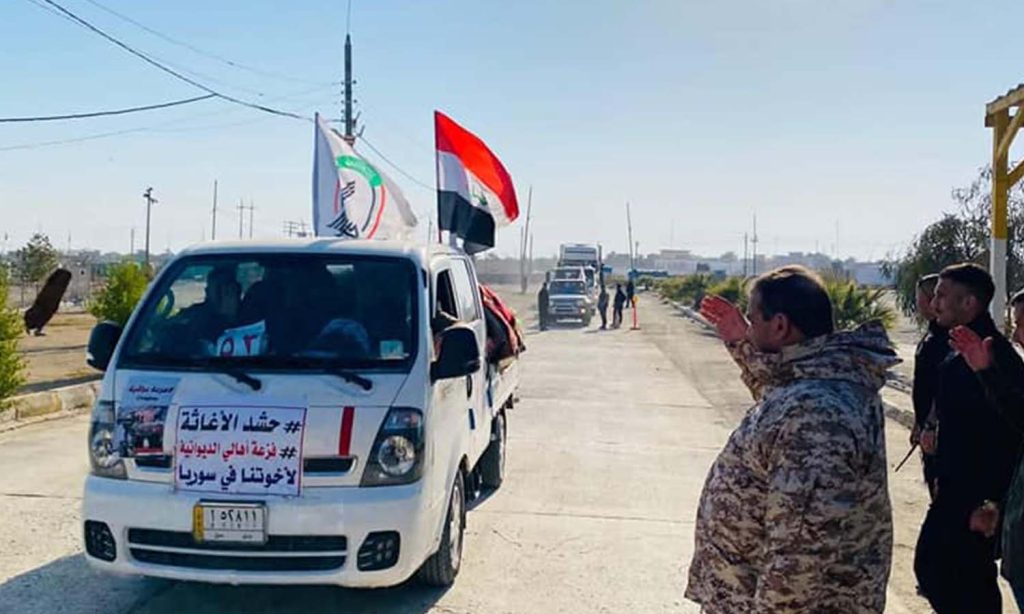The Iraqi Popular Mobilization Committee announced that the technical and engineering teams of its Iraqi relief mission in northern Aleppo governorate had prepared a model of prefabricated houses.
The announcement came days after local pages and Syrian activists circulated news on social media that the Iraqi Popular Mobilization Committee (PMC) was ready to build housing units for those affected by the earthquake in Aleppo.
The Mobilization Committee, or Al-Hashd Al-Shaabi, said on its Facebook page that the apartments are a “gift” to those affected by the earthquake in Syria, noting that work on the plan took four hours to approve the technical specifications regarding safety conditions and emergency social housing.
The Iraqi Mobilization Committee is awaiting approval from the Aleppo Municipal Council to designate a plot of land to build 400 apartments to compensate 400 families affected by the earthquake, according to pro-regime news feeds.
Ayman al-Dassouky, researcher at the Omran Center for Strategic Studies, told Enab Baladi that the information about the Popular Mobilization Committee shows intentional leaks.
The leaks aim to put pressure on the Syrian regime to grant the Popular Mobilization Committee a concession to build apartments in Aleppo, which shows the regime in a weak position due to its inability to provide a similar response to those affected by the earthquake, according to what the researcher specializing in political economy and local administration said.
Al-Dassouky believes that the Mobilization Committee is seeking to put pressure on the regime with the aim of making concessions to it in exchange for its continued support.
On February 26, the local Athr Press website quoted Abdul-Qadir Dawalibi, a member of the executive office concerned with the Aleppo Governorate Council, as saying that the Aleppo Governorate Operations Room is studying a set of options for prefabricated buildings that were agreed upon to be manufactured, and they were put forward in the meeting held by the Minister of Local Administration with the Operations Room.
The Aleppo governorate will make its decision soon, Dawalibi added, pointing out that once the decision is issued regarding the type and shape of the housing units, they will be announced, and the bodies that can help with them, whether from the local authorities or “brothers and friends.”
Response concentrated in Aleppo
The Iraqi Popular Mobilization Committee emerged among the first to respond to the earthquake disaster since February 6, especially in Aleppo, as it assumed a large part of the relief operations.
This emerged in the presence of the Chief of Staff of the PMC Abdul-Aziz al-Muhammadawi (Abu Fadak), in Aleppo city, even before the belated visit of the head of the Syrian regime, Bashar al-Assad, to the quake-hit areas.
During al-Assad’s visit, he exchanged a short conversation with al-Muhammadawi, during which he praised the Iraqi position on the disaster of the earthquake, saying, “You made blood (sacrifices), so it is not surprising that you made a sweat (physical exertion).”
The activity of the Popular Mobilization Committee focused on responding to the earthquake in Aleppo, as about 17 factions are active in Aleppo, while the number of active factions in Latakia does not exceed three, according to what the researcher al-Dassouky wrote on his Twitter account.
Al-Dassouky attributed the focus of the PMC on Aleppo to the Iranian interest in Aleppo as a base for its influence in northern Syria.
The researcher explained that Aleppo’s commercial and industrial status and its location on strategic roads allow the party controlling it to expand east and west, which is what Iran seeks.
The religious dimension and the Shiite narratives about Aleppo cannot be ignored, according to al-Dassouky, pointing to the possibility that Aleppo will be a gateway to strengthening the regional role of Iraqi Popular Mobilization.
More than three weeks after the quake disaster, the Popular Mobilization Committee continues its response in Aleppo and promotes its ongoing efforts to help those affected in the region.
On February 15, Hussein Makhlouf, the regime’s minister of local administration, honored al-Muhammadawi, the PMC’s Staff Chief, “for his great role in supporting the Syrian people in facing the effects of the earthquake that struck the country.”
The Popular Mobilization Committee includes several Shiite factions supported by Iran, which in turn praised through their media the efforts of the “committee” in responding to the earthquake.
Enab Baladi concluded in a previous report that the quake response of Iran and the Popular Mobilization Committee falls within two tracks, political and military. The relief activity seeks to convey a message to the international community that the role of the Iraqi Popular Mobilization, the Lebanese Hezbollah, and other pro-Iranian entities is based on serving the Syrian people.











